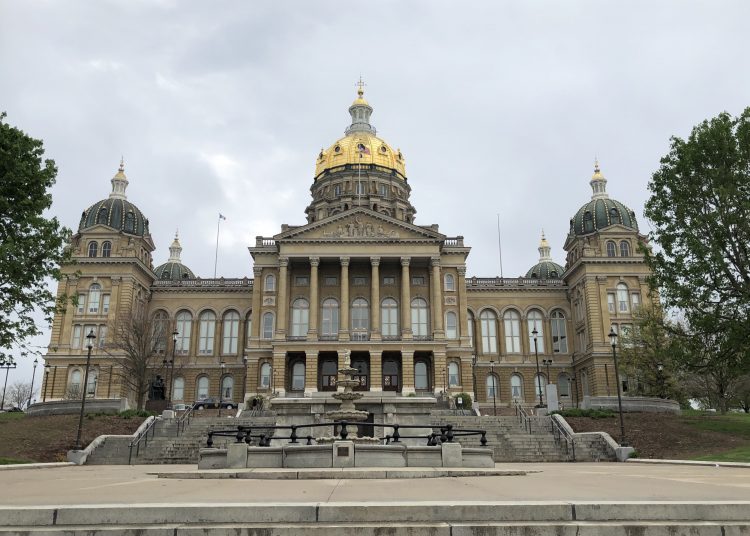Governor Kim Reynolds and the legislature will have an opportunity to enact significant tax reform in 2022. Iowa’s fiscal house is in strong condition with a $1.24 billion surplus and the recent Revenue Estimating Conference (REC) projections show strong revenue growth for Fiscal Years 2022 and 2023. This is a historic opportunity to lower Iowa’s high income tax rates and provide significant tax relief for taxpayers. It is also an opportunity for policymakers to enact pro-growth tax reform that starts Iowa on the path to eliminate the state income tax.
Governor Reynolds and the Republican-led legislature have made tax reform a priority. In 2018, the legislature passed a comprehensive tax reform bill that broadened the sales tax base and lowered both the individual and corporate income tax rates. In 2021, the legislature passed another comprehensive tax reform measure that brought clarity to the tax code by eliminating the revenue triggers that had been put in place in the 2018 tax reform law. By eliminating the triggers, the top individual income tax will be lowered to 6.5 percent in 2023. Iowa’s corporate tax rate is 9.8 percent, which even though was lowered from 12 percent, is still considerably high and uncompetitive.
Governor Reynolds in signing the 2021 tax reform bill into law not only pledged that this was just the bigging for tax reform, but her ultimate goal is to repeal Iowa’s income tax. “But we are not done yet. Next year, I’ll be proposing additional income tax cuts as we continue to make Iowa the most attractive place in America to open a business, raise a family, and start a career,” stated Governor Reynolds.
Senate Majority Leader Jack Whitver, a champion of fiscal conservatism, shares Governor Reynolds goal of eliminating the income tax. “Right now, there are about eight states that do not have an income tax. There are another eight states that have said: ‘We want to get on a path to no income tax.’ And I would like Iowa to be included in those states that say: ‘Ultimately the goal is to get to nothing,” stated Senator Whitver.
It is not just “Red” or Republican states that are considering tax reforms along with the goal of eliminating their income tax. Colorado’s Democrat Governor Jared Polis has stated that he would like to see their income tax eliminated.
The evidence is clear that states without an income tax are doing well economically. “Eight states do not impose individual income taxes of any kind and they are thriving,” explained Grover Norquist, President of Americans for Tax Reform. A major lesson from the United States Census demonstrates that tax rates matter, and high tax states are experiencing an exodus of people as they leave for states with better tax climates.
“No income tax states are so visibly thriving that now nearly a dozen additional states are working to follow suit and phase out their income taxes over the decade, primarily through the use of surpluses and revenue triggers,” stated Norquist.
Patrick Gleason, Vice President for State Affairs at Americans for Tax Reform (ATR), argues that “spending restraint, coupled with income tax cuts based on revenue triggers,” are effective tools that states such as North Carolina have used to enact pro-growth tax policies. Other states such as Mississippi and Arizona have considered or are utilizing triggers to enact income tax rate reduction.
Triggers should be designed to guide and help tax rate reduction and not serve as an obstacle. This was a mistake of Iowa’s 2018 tax reform law, which contained a 4 percent growth trigger. This created an unnecessary obstacle that favored increasing government spending over tax reduction.
“A well-designed revenue trigger allows states to put their income taxes on the path to zero without the need to cut current spending or raise other taxes, and without the fear of getting over their skis. If revenue hits a certain threshold, income tax rates will be permanently reduced. It is a simple, responsible way to provide pro-growth tax relief. States just need to make sure the triggers are not too difficult to reach,” stated ATR President Grover Norquist.
Nevertheless, the difficult part of any tax reform is it must simultaneously consider spending. Taxes and spending are linked and Jonathan Williams, Chief Economist at the American Legislative Exchange Council (ALEC), describes them as “opposite sides of the same fiscal coin.” In other words, “broad-based tax relief must be paired with responsible prioritization of spending,” noted Williams. Lowering and controlling the growth of spending is vital to any tax reform.
“States that spend less are able to tax less,” noted Dave Trabert, CEO of the Kansas Policy Institute. Spending is at the heart of taxation. Trabert also argues that states that tax income spend 56 percent more per resident than states without an income tax. States with an income tax also tend to have higher local taxes.
This year, Iowa was one of a dozen states that enacted tax reform. This is historic because any tax reform was seen as impossible because of the economic impact of the COVID-19 pandemic. As a result of keeping the economy open and following a policy of fiscal conservatism, Governor Reynolds was able to usher in a quick economic recovery from the pandemic.
Iowa’s historic budget surplus and the REC’s positive revenue outlook is creating a clear pathway for the legislature to enact serious tax reform. In addition, to a $1.24 billion surplus the reserves (Cash Reserve and Economic Emergency funds) are full and $1.054 billion is sitting in the Taxpayer Relief fund.
The legislature will be pressured by numerous special interests demanding either new or additional spending on their various program. Democrat legislators have also argued that any tax reform should be targeted only to lower income groups. Any tax relief should not be directed toward a certain socioeconomic group, but to all taxpayers. The objective for tax reform should be actual rate reduction that benefits all taxpayers.
Senator Whitver recently argued that any tax reform in 2022 should apply to all Iowans. “We want it to apply to every Iowan and that’s what we’ve done over the last five years is cut taxes for everybody,” he said.
Lowering tax rates is never easy and it must be approached carefully. Repealing the income tax is a worthy policy goal, but will be difficult, but not impossible. Iowa relies heavily on income tax to fund state government. It is estimated, in Fiscal Year 2021, 57.3 percent of state revenues will be generated from income (individual and corporate) taxes, while 33.1 percent will originate from sales taxes.
Eliminating the income tax would be a pro-growth tax reform policy change.
Even if eliminating the income tax is sound policy, there are other ways to achieve the same goal. Iowa can look to other states who have enacted pro-growth tax reforms without eliminating their state income tax. Utah, North Carolina, and Indiana are examples of states that have both broadened their tax base and lowered income tax rates.
These states and their citizens are benefitting from pro-growth tax reform. Utah, North Carolina, and Indiana are also states which are economically competitive because of their tax friendly business climates. Utah, as an example, has almost tripled its gross domestic product since 1999. North Carolina is even currently considering eliminating their corporate income tax.
Eliminating the state income tax is a worthy policy goal for Iowa. Iowa has the potential to build upon recent pro-growth tax reforms that place taxpayers first and make our state more competitive. Whether Iowa follows states such as Arizona, Mississippi, among others that are trying to eliminate the income tax or following North Carolina’s approach in lowering income tax rates, our state has the potential to become a leader in the Midwest for pro-growth tax reform.
















